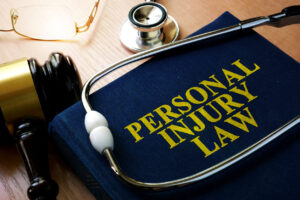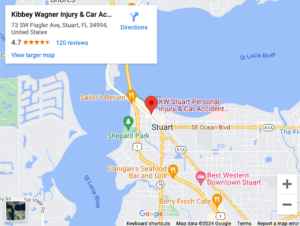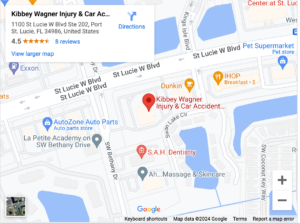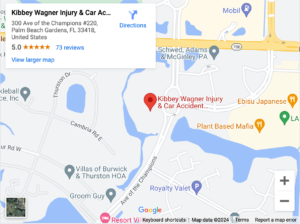
A personal injury case typically seeks compensation from a negligent party who caused harm to someone else. If the plaintiff – the person bringing the case – is able to establish a personal injury claim, they may be able to receive compensation for the losses they suffered.
An experienced personal injury lawyer can review the circumstances surrounding the accident and determine if you may have grounds for a personal injury case.
Basis of Personal Injury Cases in the Law

Personal injury cases fall under tort law. Torts are civil wrongs for which courts impose liability. Most personal injury cases are based on the legal concept of negligence. However, some personal injury cases are based on intentional conduct like assault or battery.
Personal injury cases usually involve some type of economic harm that someone has caused to another person. For example, in a medical malpractice case, a surgeon who was distracted and caused nerve damage in their patient may have been negligent. The law holds such parties financially responsible for the harm they caused, such as the victim’s medical expenses and lost wages.
The goal of a personal injury case is to make an accident victim “whole” again by returning them to the position they were in before the accident. This is typically expressed in financial terms.
Differences Between Personal Injury and Criminal Cases
In some situations, an action may form the basis of a personal injury case and a criminal case. For example, a driver who drinks and drives and crashes into another vehicle may be subject to criminal charges for DUI. However, they may also be named as a defendant in a personal injury case so that the victim can recover compensation for their damages.
Common Types of Personal Injury Cases
There are many types of accidents that can provide grounds for a personal injury case, including:
- Airplane accidents
- Bicycle accidents
- Boating accidents
- Car accidents
- Construction accidents
- Defective products
- Dog bites
- Lyft accidents
- Mass transit accidents
- Medical malpractice
- Motorcycle accidents
- Negligent security
- Pedestrian accidents
- Premises liability
- Recreational Vehicle accidents
- Scooter accidents
- Slip & fall accidents
- Taxi accidents
- Truck accidents
- Uber accidents
- Wrongful death
Some personal injury cases are based on intentional conduct, such as:
- Assault injuries
- Nursing home abuse
- Sexual assault
An experienced personal injury lawyer can review the circumstances surrounding your injuries and determine if you have grounds for a personal injury case.
What Do You Have to Prove in a Personal Injury Case Based on Negligence?
To recover compensation for your injuries in a case based on negligence, you must be able to prove the following legal elements:
Duty of Care
The first thing you have to prove is that the defendant owed you some kind of duty of care. The duty often depends on the circumstances and the relationship between the plaintiff and defendant.
Some examples of duty include:
- Motorists must obey the rules of the road and drive in a safe way that prevents collisions with others
- Medical providers must provide healthcare consistent with the applicable standard of care
- Property owners must keep their premises in a safe condition to avoid injury to visitors
If there is not a specific duty established by statute, there is usually a general duty to act in a reasonable manner. The defendant must have been able to foresee the harm that ultimately injured the plaintiff.
Breach of Duty
The next element you must be able to prove is that the defendant breached the duty of care. A breach may involve an action, such as texting while driving. It can also be an omission, such as failing to obey the right-of-way.
Causation
You must be able to show a direct link between the defendant’s breach of duty and your injuries. For example, if you were injured on a broken stair when you visited a friend’s house, you would have to show that your friend’s failure to warn you about the broken stair or fix it caused you to fall and get injured.
Damages
Damages are the losses you suffer because of your injuries.
For example, you may be able to recover compensation for:
- Medical expenses
- Lost wages
- Reduced earning capacity
- Property damage
- Out-of-pocket expenses
- Pain and suffering
- Emotional distress
A personal injury lawyer can help gather evidence to support your claim for compensation.
Compensation You May Be Able to Recover from a Personal Injury Case
You may be able to recover compensation for the losses you suffer in a personal injury accident, such as:
- Past and future medical expenses – You can recover compensation for emergency room visits, hospital stays, ambulance charges, physical therapy, medication, and other medical costs.
- Lost wages and lost earning capacity – Compensation may include payment for lost wages and any reduction or loss in earning capacity due to injuries you suffered in the personal injury incident.
- Property damage – If your vehicle or other personal property was damaged in the accident, you could be compensated for the cost of repairing or replacing your property.
- Out-of-pocket expenses – You could recover compensation for out-of-pocket expenses you incur, such as car rentals, mileage to doctor’s appointments, towing, and medical co-pays.
- Pain and suffering – You could receive compensation for the non-economic damages you sustain, such as your physical pain and suffering that followed the accident.
- Emotional distress – You may suffer emotional or mental distress or anguish. Personal injury law allows you to recover compensation for these damages as well.
Your personal injury lawyer can gather evidence to establish the value of your damages.
Caps on Damages in Florida Personal Injury Cases
Economic damages are not capped in Florida personal injury cases. However, in Florida medical malpractice cases, non-economic damages are typically capped at $500,000.
Punitive damages in Florida are typically capped at $500,000 or three times the compensatory damages, whichever is greater. Punitive damages are intended to punish the defendant for their behavior instead of compensating the accident victim.
Time Limits in Florida Personal Injury Cases
Each state has what is known as a statute of limitations that provides a time limit for when you must file a lawsuit. In Florida, the general statute of limitations is two years from the date of the accident. If you pass this deadline without filing your claim, the court can dismiss your case, and you could lose the opportunity to recover compensation.
Personal injury cases are often complex. It can be difficult to handle a claim while also recovering from serious injuries. Our experienced personal injury attorneys can help ease your burden. Contact or call Kibbey Wagner Injury & Car Accident Lawyers at (772) 444-7000 if you need legal assistance.




